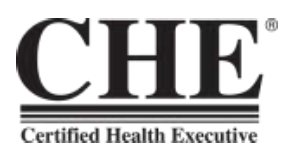Program Overview
LEADS Online Self-Assessment
The LEADS Online Self-Assessment helps individuals at all levels of leadership to better understand their skills and behaviors with respect to the LEADS framework.
Career Development Plan
Health leaders bring a different set of foundational capabilities and needs to their career development. This involves the development of a learning plan to help personalize their professional growth within a well-established framework; reflecting on their leadership experience and feedback, translating these insights into action, and involving their manager/director in the process (where applicable). It also serves as an ongoing reference point for the CHE candidate, clarifying their expectations for acceptable progress.
Exam
Candidates must write the online exam within 6 months of completing and submitting the Career Development Plan. Candidates not writing the exam within the 6-month timeframe will be required to pay an administration fee to extend the deadline. The online CHE exam is a duration of three hours and questions focus on health system issues across the continuum of care and across a variety of health sectors. It is composed of multiple choice and short answer questions. The questions are aligned with the five domains of the LEADS in a Caring Environment framework. These domains are: (1) Lead Self; (2) Engage Others; (3) Achieve Results; (4) Develop Coalitions; (5) Systems Transformation.
LEADS in Action Project
The LEADS in Action Project is relevant to the context and practicability of health leader's environments. It is flexible, enabling candidates to work on case studies either by choosing a predetermined topic or by focusing on an area of experience and/or interest from their workplace. Candidates are given two options on how to complete this part of the CHE Program.
Option 1: Candidates may have interest in working with one of the selected case studies which profile issues within national and international organizations.
Option 2: Candidates may have a recent health leadership issue in the workplace that they have been asked to analyze – prospectively or retrospectively.
Whichever route is chosen, candidates will demonstrate leadership capability through summarizing findings in a Briefing Note. Through the Briefing Note, candidates will identify, analyze and recommend the decisions to be made, or what decisions need to be made to resolve the issue. LEADS in Action projects submitted later than March 1 of any year may not be processed in time to permit the candidate to convocate in the same year.
Candidate's Evaluation of the CHE Program
This element measures the relevance of the CHE Program to the expectations of the individual CHE candidate. Each candidate is asked to evaluate all program elements, including the link with the LEADS in a Caring Environment framework. Candidates’ evaluations are a formal part of the quality improvement review process for the CHE Program.
This page is based on this
Wikipedia article Text is available under the
CC BY-SA 4.0 license; additional terms may apply.
Images, videos and audio are available under their respective licenses.
